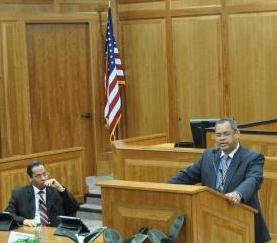Dominican Republic

Natalie Wright Romeri-Lewis, Research Advisor
Fidel Lorenzo Meran, Minister, Dominican Council of Evangelical Unity, described in detail the Christian roots of the Dominican Republic and how the country embeds Christianity in government. First, the name ‘Dominican Republic’ means ‘Land of God.’ As the Dominican Republic became independent, it did so enshrining three principles: “God, Fatherland, and Liberty.” The three principles reflect the trinity and are found in the Constitution. Next, the Constitution specifically mentions the Catholic and Evangelical churches by name. In addition, when taking an oath, politicians state, “I promise in front of God.” Furthermore, the flag of the Dominican Republic is the only flag in the world with an open Bible and a cross. Today, Evangelicals make up 22% of the population, practicing Catholics make up 40% of the population, and non-practicing Catholics make up over 20% of the population.
Mr. Meran next proposed his thesis that religion assumes many roles within society and actually defends society. “Government institutions are sometimes weak, and people do not believe that government can function well by itself.” When government fails to enforce laws, churches act as watchdogs and lobby the government to perform its responsibilities. In this sense, religion is powerful and plays a beneficial role in society.
Elvis Medina, Bishop, Iglesia de Dios, is an educator and religious liberty advocate and represents the Evangelical community at Billy Graham Ministry events. He began his presentation stating that the most intolerant people are religious people. The Dominican Republic, however, “has freedom of religion without limit. [The country] has never experienced religious persecution, but also has never had such pluralism [as other countries have experienced].” He feels that “religion has to grow with social dynamics and economic dynamics.” He joked that faiths differ in the ways they stimulate the faith, “Ten Evangelicals might feel like 100; 100 Catholics might make the noise of two people.” He thinks, however, that people in “Utah do not enjoy religious freedom because a majority of people are from the same major religion.”
Mr. Medina is most concerned about the Concordat (treaty) the Dominican Republic maintains with the Vatican despite its potential unconstitutionality. Although the Constitution of the Dominican Republic states the country has no official religion, the Concordat declares the official religion as Catholic. Mr. Medina feels the Concordat with the Vatican is “unconstitutional when speaking of constitutional law, unjust when speaking of religious diversity, and political when it is convenient.” Mr. Medina offered, “If it’s between the Concordat and the Constitution, I believe in the Constitution.” He further explained, “Laws regarding religion can benefit the majority and hurt the minority, so you have to look at [whether a law provides] the most good and the least bad.” As much as “the Evangelical Church wants an end to the Concordat, the lack of political will stalls the process. Mr. Medina sees the Concordat debate as shadowed by the urgency of helping needy populations: “The Evangelical Church will grow with or without the Concordat.”